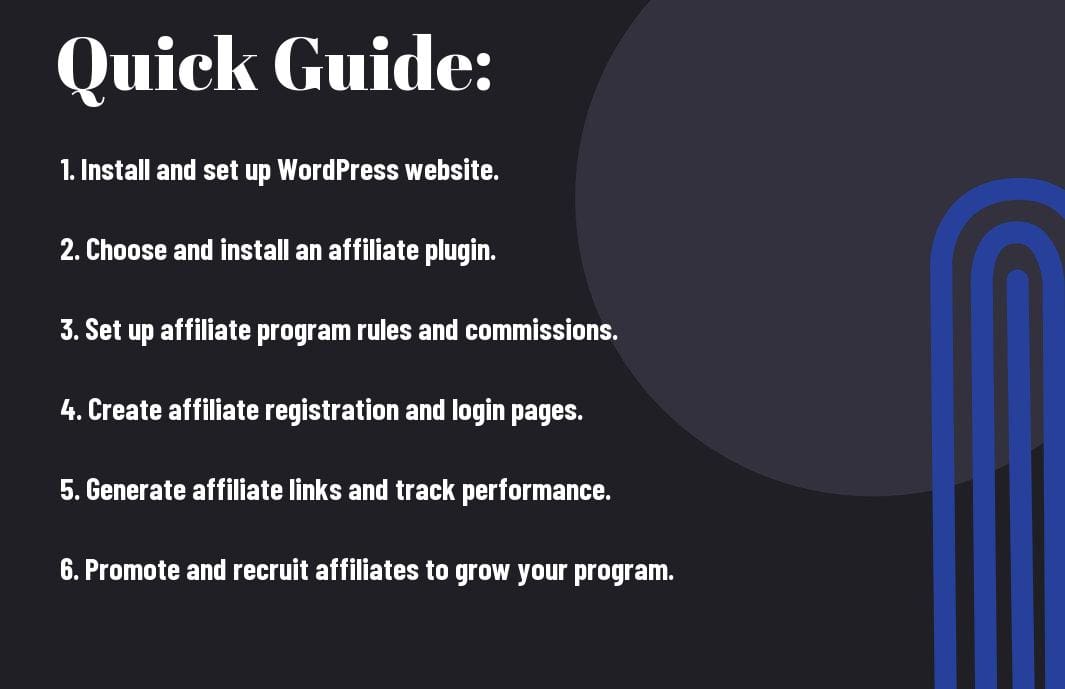Many newcomers to the world of online marketing have found great success with WordPress affiliate systems, leveraging this powerful platform to generate passive income through partnerships with brands. In this comprehensive guide, we will walk you through the crucial steps to set up your own affiliate system on WordPress, from choosing the right plugins to tracking and optimizing your performance. Learn how to maximize your earnings by implementing proven strategies and avoiding common pitfalls. Take control of your online business today and turn your WordPress website into a lucrative affiliate marketing powerhouse.
Key Takeaways:
- Choose the Right Affiliate Plugin: Selecting a suitable WordPress affiliate plugin is crucial for setting up a successful affiliate system. Look for features like tracking, reporting, and integration with popular e-commerce platforms.
- Set Clear Commission Structure: Clearly define how much commission affiliates will receive for each sale or referral they make. This helps motivate affiliates to promote your products/services more effectively.
- Provide Marketing Materials: Offer affiliates banners, text links, and other promotional materials to make it easier for them to promote your products/services. These resources can significantly boost their marketing efforts.

Understanding Affiliate Marketing
Any successful journey into the world of affiliate marketing begins with a solid understanding of the concept. In essence, affiliate marketing involves partnering with other businesses or individuals to promote their products or services in exchange for a commission for every sale or lead generated through your referral.
Types of Affiliate Programs
- Pay-Per-Sale (PPS) – Earn a commission for every sale made through your referral.
- Pay-Per-Lead (PPL) – Earn a commission for every lead generated through your referral.
- Pay-Per-Click (PPC) – Earn a commission for every click on the affiliate link.
- Two-Tier Programs – Earn commission not only for your own sales but also for sales made by affiliates you referred.
- Recurring Programs – Earn recurring commissions for as long as the referral continues as a customer.
This breakdown can help you determine which type of program aligns best with your goals and target audience.
Factors to Consider in Affiliate Marketing
- Niche Relevance – Ensure the products or services offered are relevant to your audience.
- Commission Structure – Understand how much commission you will earn for each sale or lead.
- Cookie Duration – Know how long the affiliate link’s tracking cookie lasts to ensure you get credited for sales made after the initial click.
- Support and Resources – Assess the level of support and resources provided by the affiliate program to help you succeed.
- Reputation of the Merchant – Partner with reputable merchants to build trust with your audience.
Consider all these factors carefully before plunging into affiliate marketing. Perceiving the nuances of each can make a significant impact on your success in the long run.
Preparing Your WordPress Site
Choosing the Right Hosting Environment
While setting up your WordPress affiliate site, choosing the right hosting environment is crucial. Avoid shared hosting as it can slow down your site and affect user experience. Opt for a reliable hosting provider that offers good uptime, security features, and scalability to support your growing traffic.
Essential WordPress Plugins for Affiliates
One vital aspect of setting up an affiliate system on WordPress is installing the right plugins. Look for affiliate management plugins that help you track and manage your affiliate links effectively. Additionally, consider using SEO plugins to optimize your content for search engines and social media plugins to easily share your posts across various platforms.
Hosting: Make sure to choose a hosting provider that offers a reliable server with fast loading times to enhance user experience. Consider a hosting plan that provides 24/7 support in case you encounter any issues with your site.
Step-by-Step Guide to Setting Up Your Affiliate System
| Planning Your Affiliate Marketing Strategy | Integrating Affiliate Plugins and Setting Up Accounts |
Planning Your Affiliate Marketing Strategy
While setting up your WordPress affiliate system, it is crucial to plan your affiliate marketing strategy meticulously. Identify your target audience, choose the right products or services to promote, and set realistic goals for your affiliate program. Research your competitors and analyze successful affiliate marketing campaigns to understand what works best in your niche.
Integrating Affiliate Plugins and Setting Up Accounts
Your affiliate system’s backbone lies in integrating affiliate plugins and setting up accounts effectively. A popular choice is using WordPress affiliate plugins like AffiliateWP or ThirstyAffiliates to manage your affiliates seamlessly. Ensure you create compelling affiliate links, set up cookie duration, and establish your commission structure. Create detailed instructions to guide affiliates on how to sign up and use their dedicated affiliate dashboard.
A successful integration of affiliate plugins and setting up accounts can maximize your revenue potential, streamline affiliate management, and boost your brand’s visibility in the market. Pay attention to detail, and always keep your affiliates’ interests in mind to nurture strong partnerships.
Tips for Successful Affiliate Marketing on WordPress
All successful affiliate marketing strategies require a solid foundation to be built upon. WordPress provides a versatile platform for creating and managing affiliate websites. To make the most out of your affiliate marketing efforts on WordPress, consider the following tips:
- Choose relevant niches to target
- Select high-quality affiliate programs
- Integrate affiliate links naturally into your content
- Engage with your audience to build trust
- Optimize your website for SEO
Assume that implementing these tips will help you create a successful affiliate marketing strategy on WordPress.
Creating Effective Affiliate Content
An necessary aspect of successful affiliate marketing is creating compelling and engaging content that resonates with your audience. Content that provides value, offers solutions, and builds trust with your readers is more likely to drive conversions. Incorporate keywords strategically to attract organic traffic and ensure that your affiliate links are seamlessly integrated into your content to enhance visibility.
Tracking and Analyzing Affiliate Performance
Content plays a vital role in affiliate marketing. To track and analyze the performance of your affiliate strategies, utilize tracking tools and performance metrics. To gain valuable insights into your affiliate performance, monitor click-through rates, conversion rates, and revenue generated from affiliate links. Identify top-performing content and refine your strategies based on the data collected.

Pros and Cons of Using WordPress for Affiliate Marketing
Once again, when it comes to using WordPress for affiliate marketing, there are various pros and cons to consider. Below is a breakdown of the advantages and potential drawbacks of using WordPress for your affiliate marketing endeavors.
| Advantages | Potential Drawbacks and How to Overcome Them |
Advantages of WordPress for Affiliates
WordPress offers a user-friendly interface and a wide range of plugins specifically designed for affiliate marketing. These plugins can help you track clicks, monitor conversions, and manage your affiliate links efficiently. Additionally, WordPress is SEO-friendly, allowing you to optimize your content for search engines easily.
Potential Drawbacks and How to Overcome Them
While WordPress is a powerful platform for affiliate marketing, it can be overwhelming for beginners due to its vast customization options. Additionally, since it is an open-source platform, you may encounter security vulnerabilities if you do not regularly update your site. To overcome these challenges, consider investing in security plugins and seek help from experienced WordPress developers.
Them It is imperative to stay updated with the latest security measures and ensure your site is regularly backed up to prevent any loss of data or potential security breaches. Additionally, seeking guidance from experts in WordPress development can help you navigate the platform’s complexities and maximize its potential for affiliate marketing.
Final Words
Drawing together the various elements discussed in this beginner’s guide, setting up a WordPress affiliate system can be a highly effective way to generate passive income through your website. By carefully selecting affiliate programs, optimizing your website for conversions, and engaging with your audience, you can create a successful affiliate marketing strategy. Remember to regularly track and analyze the performance of your affiliate links to continuously improve and maximize your earnings. With dedication and persistence, you can harness the power of affiliate marketing to grow your online business and increase your revenue streams.
FAQ
Q: What is a WordPress Affiliate System?
A: A WordPress Affiliate System is a way for website owners to earn money by promoting products or services offered by other companies. Affiliates earn a commission for each sale or lead generated through their unique affiliate link.
Q: How do I set up a WordPress Affiliate System?
A: To set up a WordPress Affiliate System, you will need to choose an affiliate marketing plugin like AffiliateWP or ThirstyAffiliates. Install and activate the plugin on your WordPress website, set up your affiliate program details, create affiliate links, and start promoting products or services.
Q: What are the benefits of setting up a WordPress Affiliate System?
A: Setting up a WordPress Affiliate System can help you generate passive income, increase brand visibility, drive more traffic to your website, and build relationships with other businesses. It is a cost-effective way to market products or services and can be a lucrative revenue stream for website owners.




